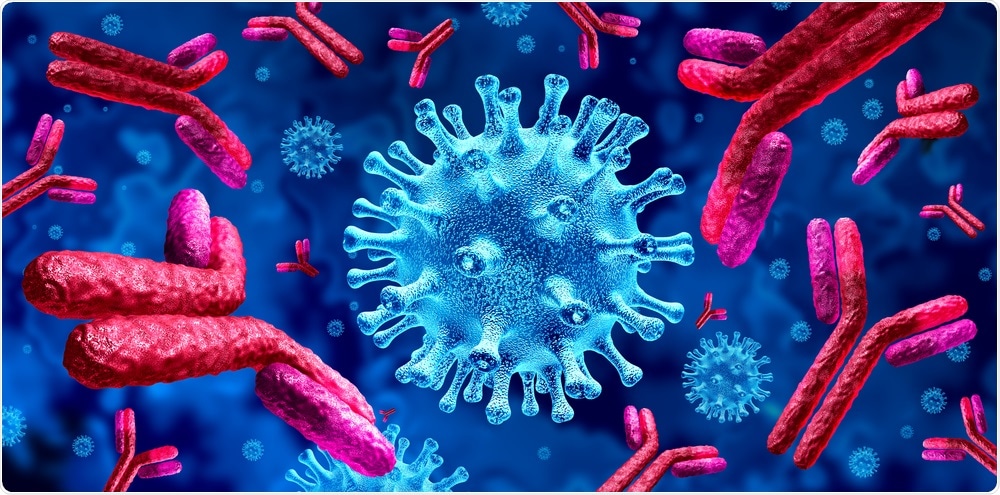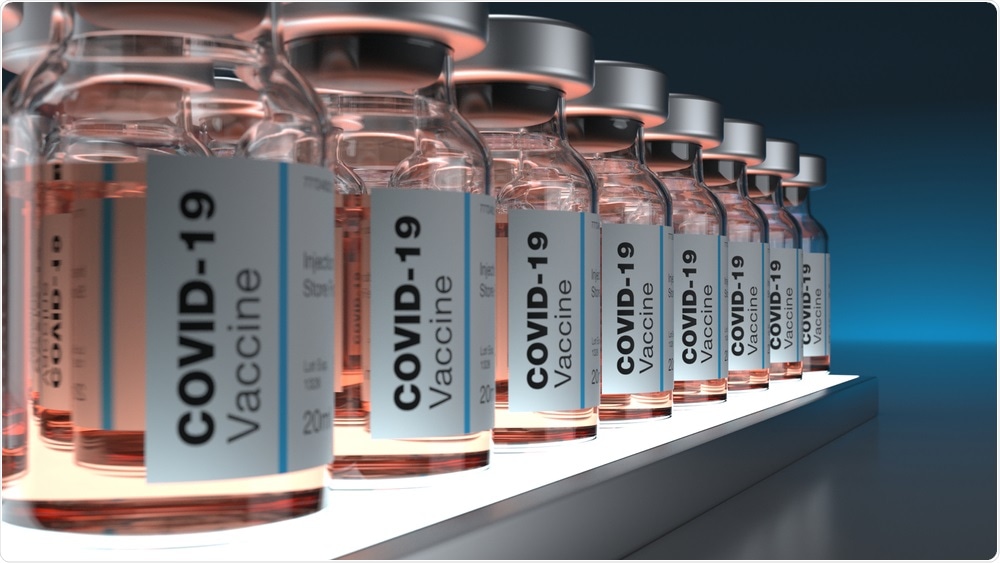The coronavirus disease (2019) pandemic arose due to the rapid spread of severe acute respiratory syndrome coronavirus 2 (SARS-CoV-2) to the farthest corners of the world, leaving large numbers of deaths in its wake. Vaccination has emerged as a beacon of hope for the human population to escape this high-level threat to global health and economic security.
Despite the promising future vaccinations offer, new variants of concern (VOCs) are constantly emerging, many of which are highly infectious. Furthermore, many of these VOCs have demonstrated their ability to escape neutralization by pre-existing antibodies to the virus or the vaccine antigen. A new medRxiv* preprint reports on the current landscape of vaccine-induced antibodies in the United Kingdom.
 Study: Breadth of neutralizing antibody responses to SARS-CoV-2 variants of concern is augmented by vaccination following prior infection: studies in UK healthcare workers and immunodeficient patients. Image Credit: Lightspring / Shutterstock.com
Study: Breadth of neutralizing antibody responses to SARS-CoV-2 variants of concern is augmented by vaccination following prior infection: studies in UK healthcare workers and immunodeficient patients. Image Credit: Lightspring / Shutterstock.com

 This news article was a review of a preliminary scientific report that had not undergone peer-review at the time of publication. Since its initial publication, the scientific report has now been peer reviewed and accepted for publication in a Scientific Journal. Links to the preliminary and peer-reviewed reports are available in the Sources section at the bottom of this article. View Sources
This news article was a review of a preliminary scientific report that had not undergone peer-review at the time of publication. Since its initial publication, the scientific report has now been peer reviewed and accepted for publication in a Scientific Journal. Links to the preliminary and peer-reviewed reports are available in the Sources section at the bottom of this article. View Sources
Background
As of June 8, 2021, more than 40 million people in the United Kingdom have received at least one dose of the Pfizer/BioNTech BNT162b2, Oxford-AstraZeneca AZD1222, Moderna, or Johnson and Johnson COVID-19 vaccine. The current vaccine schedule has extended the gap between the first and second doses beyond 12 weeks to cover as much of the population with at least one dose.
This strategy appears to be working in terms of the significant reduction in the number of symptomatic and severe COVID-19 cases, as well as reported COVID-19-related deaths. However, breakthrough infections are still being reported after one or both doses of the vaccine.
Taken together, new infections continue to rise, which points to ongoing transmission in the vaccinated population, even as VOCs spread rapidly to dominant positions globally. With this in mind, the question remains – are vaccines efficacious against these newer strains?
In addition to this question, many are also looking to understand the extent of protection offered by a single vaccine dose against SARS-CoV-2 and whether the vaccines are effective in immunocompromised individuals.
Loss of vaccine efficacy with VOCs
Earlier studies have shown that the Astra-Zeneca vaccine does not protect against the B.1.351 SARS-CoV-2 strain, which was first identified in South Africa. The Pfizer vaccine also appears to be 20% less effective against this same strain. This reduced efficacy has been confirmed in Israel, where a higher proportion of B.1.351 breakthrough infections was reported in individuals who were fully vaccinated as compared to non-vaccinated individuals.
If VOCs continue to circulate despite widespread vaccination efforts, there is an increased risk that immune-resistant strains could emerge, thus leading to new surges in infection rates. Another incubator for such variants has been identified in the form of immunodeficient patients who fail to clear the virus, which allows prolonged replication to occur over weeks or months.
Efficient vaccine response with a history of infection
The current study explores the neutralizing efficacy of several different COVID-19 vaccines against the B.1.1.7, B.1.351, and P.1 SARS-CoV-2 strains. The findings show that immunodeficient patients do not respond well to a single dose of the vaccine, with neutralizing antibodies (NAbs) to B.1.1.7 and B.1351 detected in only 5% and 3% of patients, respectively.
In vaccinated healthcare workers, which were the primary subjects in the other cohort in the study, less than half of those naïve to natural infection had NAbs to the vaccine strain B.1, while NAbs to B.1.1.7 were detected in less than 40% of those in this group. Furthermore, less than 10% of these vaccinated healthcare workers were found to have NAbs against both the B.1.351 and P.1 SARS-CoV-2 strains.
Conversely, with a history of prior infection, vaccination elicited high anti-B.1-NAb titers at 5,000 to 34,000 International Units, which is comparable to the 3,000 to 10,000 titer values that are required for 50% inhibition of the virus (50% inhibitory concentration, IC50).
Individuals with a history of SARS-CoV-2 infection also showed a marked increase in NAb titers against the three VOCs after one dose of either vaccine. Vaccination, therefore, remains necessary, even for those who have already been infected. The importance of the second dose also becomes obvious in terms of the improved immunity it offers naïve recipients.
 Image Credit: Dmetris Barletis / Shutterstock.com
Image Credit: Dmetris Barletis / Shutterstock.com
What are the implications?
These findings emphasize the enhanced neutralizing capacity offered by one dose of the COVID-19 vaccines in a previously infected individual. These neutralizing antibodies act not only against the vaccine strain itself but against the three most prevalent VOCs.
Individuals without such a history have a weak neutralizing response to all variants, while the response of immunodeficient individuals is negligible.
More work is necessary to define the cut-off at which NAb titers against circulating VOCs become clinically useful in terms of their protective effects against SARS-CoV-2 infection or disease. This must be measured in large population groups to assess the accurate value at which protection occurs.
Such findings will help identify the groups at risk of breakthrough infections and those who will require booster vaccine doses with either the current vaccine or those based on newer strains.
Antibody titers are very useful in planning and implementing containment measures to prevent the emergence of other VOCs. Targeted vaccination efforts that are focused on these communities will further prevent the uncontrolled spread of existing VOCs and the rise of novel strains.

 This news article was a review of a preliminary scientific report that had not undergone peer-review at the time of publication. Since its initial publication, the scientific report has now been peer reviewed and accepted for publication in a Scientific Journal. Links to the preliminary and peer-reviewed reports are available in the Sources section at the bottom of this article. View Sources
This news article was a review of a preliminary scientific report that had not undergone peer-review at the time of publication. Since its initial publication, the scientific report has now been peer reviewed and accepted for publication in a Scientific Journal. Links to the preliminary and peer-reviewed reports are available in the Sources section at the bottom of this article. View Sources
Journal references:
- Preliminary scientific report.
Nadesalingam, A., Cantoni, D., Wells, D. A., et al. (2021). Breadth of neutralising antibody responses to SARS-CoV-2 variants of concern is augmented by vaccination following prior infection: studies in UK healthcare workers and immunodeficient patients. medRxiv preprint. doi:10.1101/2021.06.03.21257901, https://www.medrxiv.org/content/10.1101/2021.06.03.21257901v1
- Peer reviewed and published scientific report.
Nadesalingam, Angalee, Diego Cantoni, David A. Wells, Ernest T. Aguinam, Matteo Ferrari, Peter Smith, Andrew Chan, et al. 2021. “Paucity and Discordance of Neutralising Antibody Responses to SARS-CoV-2 VOCs in Vaccinated Immunodeficient Patients and Health-Care Workers in the UK.” The Lancet Microbe 2 (9): e416–18. https://doi.org/10.1016/S2666-5247(21)00157-9. https://www.thelancet.com/journals/lanmic/article/PIIS2666-5247(21)00157-9/fulltext.